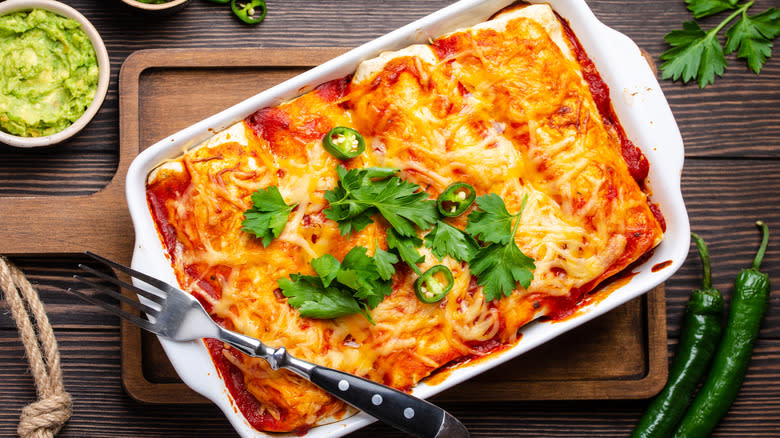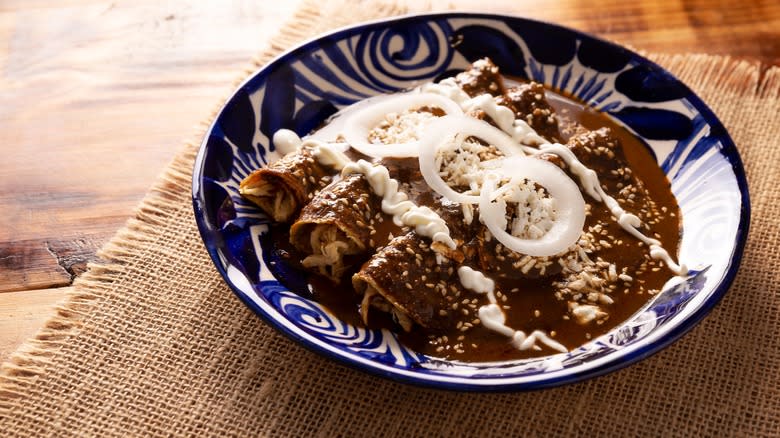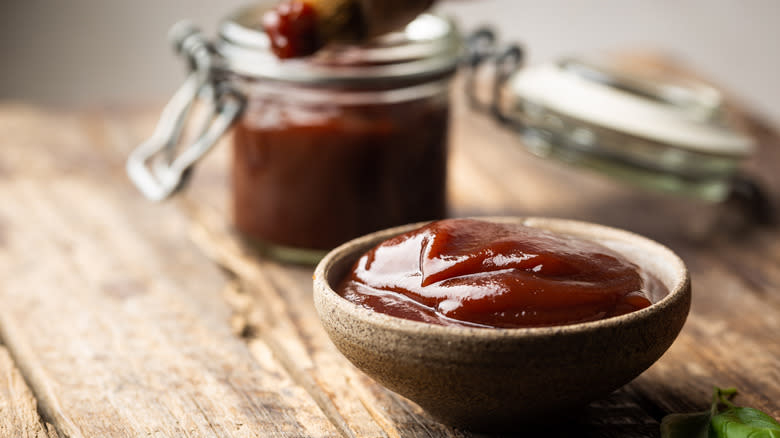Barbecue Sauce Takes This Mexican Dish To A Whole New Level

The cooking traditions of Mexico have made a deliciously dramatic, indelible impact on the American culinary landscape. However, for many, when it comes to classic comfort foods boldly brimming with Mexican flavors, one dish stands alone: Enchiladas. To make a proper baked enchilada platter, anywhere from a half-dozen to a dozen tortillas are individually rolled around a filling, placed alongside each other, slathered in sauce, topped with cheese, and cooked in the oven until bubbly, resulting in a meal that's infinitely homey. Other enchiladas are made by flash-frying tortillas and coating them in sauce before filling.
So what's the key to the ultimate enchilada? Sure, you can focus on the size of the tortilla or the filling or the type of cheese, but the most important element is the sauce, which not only provides moisture and flavor, but also helps prevent the tortillas from sticking to the bottom of the baking dish. A classic enchilada sauce, which is like a smooth, smoky tomato sauce, is one popular choice; a dark and nutty mole is another, but if you're looking for the best of both worlds, you can turn your attention to another condiment popular in Southwestern cooking — barbecue sauce. Yes, barbecue sauce has all the tang, smoke, spice, and complexity necessary to take your next platter of enchiladas to new and flavorful heights.
Read more: The 15 Best Store-Bought Barbecue Sauces, Ranked
Enchiladas And Barbecue Sauce Are A Natural Match

Enchiladas have a lot going for them -- they're cheesy, satisfying, and totally customizable based on your taste preferences (or pretty much whatever is currently hanging around your pantry/fridge). Their only drawback is that they can turn out a bit dry if they're too judiciously sauced. To get around this, it's customary to spread a thin layer across each tortilla before adding the filling, with many traditional recipes recommending that the entire tortilla itself be dipped into the sauce in order to make it more pliable.
And while you can do this with standard enchilada sauce or jarred salsa, barbecue sauce contributes another dimension of flavor and consistency to the dish. The most widely recognizable version of the condiment contains a variety of ingredients that are common to both enchilada sauce and mole, along with some interesting extras that will undoubtedly punch up the complexity. Ketchup, molasses, and brown sugar bring a rustic sweetness, while vinegar and Worcestershire sauce contribute acid and twang. Many brands of barbecue sauce contain chiles for that extra kick, and most will also have some paprika and liquid smoke for a subtle campfire flavor. When poured over the enchiladas and baked in the oven, the barbecue sauce becomes slightly crisp and caramelized, adding a mouthwatering outer layer that's comparable in flavor to crème brûlée's crackly top. If the consistency of the sauce is too thick, try thinning out the sauce with some warm water.
The Right Barbecue Sauce For Your Enchiladas

Not all barbecue sauces are created equal. A majority will possess a blend of sweet and sour flavor, but the similarities more or less stop there. In the U.S., barbecue sauce is a regional condiment that often differs from state to state, so depending on where you are in the country, you may come across a bottle that's totally unique in taste, flavor, and viscosity.
Barbecue sauces can be easily categorized by their base ingredients. The tomato-based style (the stuff hailing from Kansas City) is ubiquitous; it's thick, dark, and sweet with a subtle tanginess that comes from a mix of ketchup, vinegar, and Worcestershire sauce. Vinegar-based sauces, meant for whole hogs or big chunks of pork, are popular in North Carolina. These sauces are thinner and used to tenderize meat while still adding some zippy flavor notes. Head south and you'll run into South Carolina's mustard-based sauces, which provide another pungent porky counterpoint. Mayonnaise-based barbecue sauce, also known as Alabama White Sauce, continues to grow in popularity thanks to its smooth consistency and a perfect marriage of the eggy condiment plus vinegar, lemon juice, and mustard -- paired with a blend of shredded cheeses, it makes for ultra creamy enchiladas.
When it comes to picking a barbecue sauce for your enchiladas, you want to aim for a blend of sweet, smoke, and brightness. Each variety possesses its own unique characteristics that will surely bring some flare to your next platter of enchiladas.
Read the original article on Daily Meal

